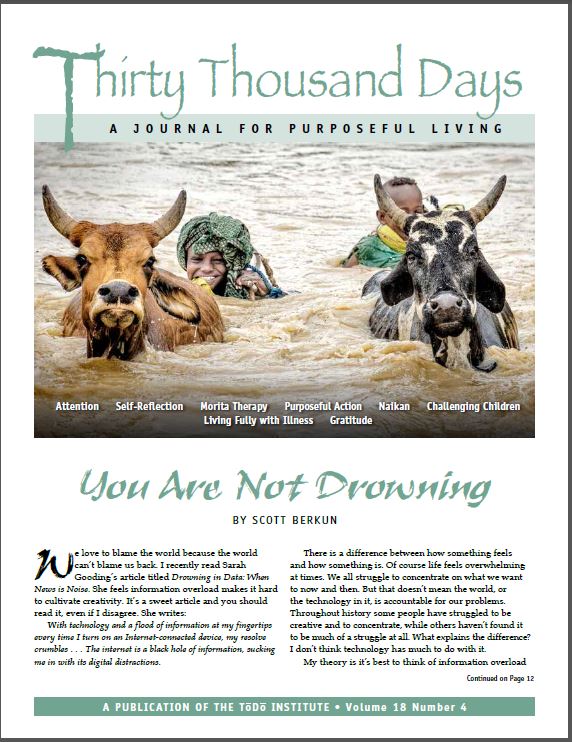Your brain is like Velcro for negative experiences, but Teflon for positive ones.
-Rick Hanson
For the past twenty years I’ve been presenting a scene at my workshops, in which a husband and wife come home after work and greet each other in the living room. One spouse begins by reporting the litany of problems faced that day – traffic, boring meetings, computer crashes, parking ticket, etc. . . When that spouse is done, the other one responds: “You think you had a bad day?? Let me tell you about my day.” And now we hear an even longer, and more dramatic, recounting of problems and complaints. By bedtime, both partners are emotionally exhausted and glad the day is over.
I now offer a second script. The setting is similar. But when asked, “Honey, how was your day?” the first spouse launches into a long list of ways in which he or she was supported: the coffeemaker worked, she didn’t get into a car accident, her eyeglasses helped her see more clearly, there was heat in her office, etc. . . In both cases, they are reporting facts. But few of us use the second script. We gravitate towards the negative – the problems, the challenges, the difficulties. Why is that?
In recent years, researchers in the field of neuroscience have discovered what they call the “negative bias” of the brain. Your brain (and mine) is actually hard-wired to notice the problems and difficulties we come up against. Historically, these were threats, and avoiding threats was how we could stay alive. So we developed a brain that was much better at noticing problems and challenges and not nearly as good at noticing how we are supported and cared for.
You can read more about the neuroscience of negativity, if you wish, in this article by Rick Hanson, author of Buddha’s Brain.
The result is that we can get overwhelmed by all the problems we are facing and lose sight of the ways we are being supported. The best way I know to counteract this negativity bias is a method of self-reflection from Japan called Naikan. Naikan works with your attention in two ways:
1. By reflecting on the past (i.e. the previous day) you step back and become more aware of how you were supported by others, rather than just getting lost in how difficult your life is.
2. Through self-reflection, you begin to influence how you see things in the present. This is one of the most interesting and least understood elements of Naikan.
Most of us put a lot of energy into trying to change our circumstances. There’s nothing wrong with that – if you can fix a problem, then by all means do so. But constantly trying to get life to unfold the way you desire it to unfold is exhausting. And it will not help you cultivate an authentic sense of gratitude. No matter how smart, wealthy and determined we are, we inevitably run into challenges that we can’t fix. Gratitude, grace, and faith – these are qualities that cannot be cultivated by working on the circumstances of our life. They are qualities that are cultivated by developing the capacity to see and understand our life in a deeper and more profound way.
Most people I know are busy. Too busy. They don’t have time for self-reflection. They are struggling to just get through the day and check off as much as possible from their to-do list. But there’s no balance in this kind of life. There’s no reflection to balance action. When you live like this, you can end up getting caught in the negative bias your brain is designed for.
Even just a few minutes of self-reflection at the end of each day can help give you a fresh perspective on your life. Try it. Take a few minutes to reflect on your life using Naikan’s three questions. It’s not about being optimistic. It’s about being realistic. So take a few moments to sip a cup of Reali-tea. It’s a tea that helps you see what your brain misses. Reality . . . the antidote to negativity.
Gregg Krech will be leading our annual Living on Purpose program from Jan. 11 – Feb. 10, 2020. Join us and start the new year in alignment with your values and purpose.











